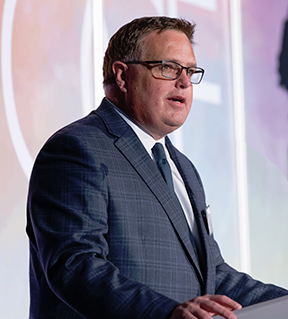Trying Times for a Relentless Optimist
9/17/2018 Article
A Letter from Max Williams, OCF President and CEO
We are, unfortunately, living in such cynical times that even good deeds are now met with suspicion. Recent articles and opinion pieces in the New Yorker and New York Times do a stunning disservice to philanthropy at this critical moment in our state and in our country. These opinions are not reflective of charitable giving in Oregon, community foundations generally and OCF’s work in Oregon, specifically.
Too much time is spent on laying blame for societal ills at the feet of so-called ‘philanthro-capitalists’ like Bill Gates or Mark Zuckerberg. This may give short-term comfort to frustrated activists and book promoters. But the commentary is misguided and potentially harmful to the cause of thousands of generous donors who have spent a lifetime giving back to their local communities, partnering with nonprofits doing tremendous work to improve the lives of Oregonians and joining together in delivering real impact to those in our cities and towns who need the most support.

Too often, critics of philanthropy begin their criticism with the viewpoint that the “money” donated really belongs to the government, not the individuals making the donation. They use terms like “uncaptured taxes,” “exploited tax code,” or “mounting losses to the US Treasury” to suggest that tax incentives favoring charitable giving are unfair yet they fail to acknowledge that the charitable deduction is the only tax deduction through which the donor receives no direct benefit.
Citing a few “billionaire donors,” they suggest that philanthropy is having an outsized influence on policy issues. But even counting the mega-donors, the overall percentage of giving on a per-capita basis has not dramatically changed in the last 30+ years – less than 3%. There are far fewer philanthropists than there are wealthy individuals. Why criticize generous individuals who are trying to make their communities and world better through their philanthropy, when others with similar wealth are simply not giving at all?
Critics will also leave the impression that if these dollars were taken as “taxes” it would result in better outcomes to the problems we are facing. Yet, no mention is made of the trillions of dollars that Government has spent on these issues – often being able to show little impact.
When one compares philanthropy’s modest dollars to those of government spending, their argument is even weaker. One case in point, during my tenure as Director of the Department of Corrections (DOC), we spent the value of the OCF endowment in 2012 (1.2 billion) – four times in the eight years I was there. An endowment that took OCF nearly 40 years to amass – and has returned a billion in grants during that same time frame – was spent four times over in the eight years I ran DOC (and that’s just Oregon – and the corrections budget paled in comparison to Human Services and Education). In this context, philanthropy dollars are a small drop in the ocean of overwhelming need.
Presenting government and philanthropy as a zero-sum game is a false choice, and frankly, outdated. OCF and partner investments in innovative strategies like the Chalkboard Project, Parenting Education Hubs, Children’s Dental Initiative, Integrated Child Database and Studio to School are all examples where Philanthropy is partnering with state and local Government agencies because they often lack the resources, flexibility, independence, or innovation – to do these projects on their own.
It is philanthropy’s unique ability to deliver “innovation capital” not the size of its capital – that makes it powerful. We should be celebrating these opportunities and working harder to find more of them.
One recent critic went so far as to suggest that philanthropy must be failing because there has been an erosion of civility and civic engagement across the country. Yet one wonders where we would be without the charitable organizations supported by foundations who are working to increase and enhance civility and civic engagement. It’s true that we are facing tremendous challenges in Oregon: the instability experienced by many families, an underperforming education system, economic stagnation facing many communities, the battle over public resources, polarization of public discourse, and the disengagement and disenfranchisement of many Oregonians from civic life. But philanthropy is working to address these challenges and can do so without the barriers and limitations of government.
Along with these gaps of opportunity for Oregon’s children and families, there are also important issues relating to the environment and our natural resource economy, higher education, protecting the right of people from oppression, providing youth chances for outdoor experiences and inspiring people through the arts to name just a few.
I’m proud of OCF and our donors who are supporting nonprofits that are working on these issues. Often donors are supporting things that government wouldn’t spend money supporting – even if they had more money.
The community foundation model is – by definition – focused on community, and our decisions involve members of the community. For more than 40 years we’ve worked to establish a network of passionate donors, community partners, nonprofit organizations and dedicated volunteers united in helping other Oregonians. Together, we are transforming individual giving into sustained, community-driven impact across the state.


Advertisement